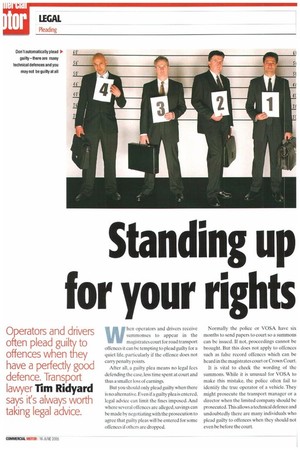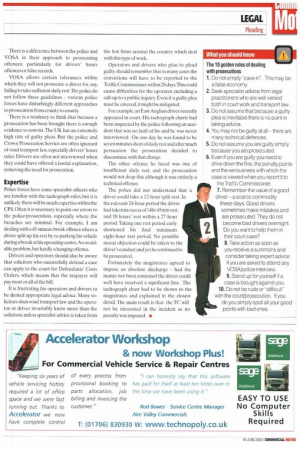Standing up for your rights
Page 42

Page 43

If you've noticed an error in this article please click here to report it so we can fix it.
Operators and drivers
often plead guilty to offences when they have a perfectly good defence. Transport
lawyer Tim Ridyard
says it's always worth taking legal advice.
When operators and drivers receive summonses to appear in the magistrates court for road transport offences it can be tempting to plead guilty for a quiet life, particularly if the offence does not carry penalty points.
After all, a guilty plea means no legal fees defending the case, less time spent at court and thus a smaller loss of earnings.
But you should only plead guilty when there is no alternative.. Even if a guilty plea is entered, legal advice can limit the fines imposed. And where several offences are alleged. savings can be made by negotiating with the prosecution to agree that guilty pleas will be entered for some offences if others are dropped. Normally the police or VOSA have six months to send papers to court so a summons can be issued. If not, proceedings cannot be brought. But this does not apply to offences such as false record offences which can be heard in the magistrates court or Crown Court.
It is vital to check the wording of the summons. While it is unusual for VOSA to make this mistake, the police often fail to identify the true operator of a vehicle. They might prosecute the transport manager or a director when the limited company should be prosecuted. This allows a technical defence and undoubtedly there are many individuals who plead guilty to offences when they should not even be before the court. There is a difference between the police and VOSA in their approach to prosecuting offences; particularly for drivers' hours offences or false records.
VOSA allows certain tolerances within which they will not prosecute a driver for, say, failing to take sufficient daily rest.The police do not follow these guidelines — various police forces have disturbingly different approaches to prosecution from county to county.
There is a tendency to think that because a prosecution has been brought there is enough evidence to convict. The UK has an extremely high rate of guilty pleas. But the police and Crown Prosecution Service are often ignorant of road transport law, especially drivers' hours rules. Drivers are often not interviewed when they could have offered a lawful explanation, removing the need for prosecution.
Expertise
Police forces have some specialist officers who are familiar with the tachograph rules, but it is unlikely there will be much expertise within the CPS. Often it is necessary to point out errors to the police/prosecution, especially where the breaches are minimal. For example, I am dealing with a 45-minute break offence where a driver split up his rest by re-parking his vehicle during a break at his operating centre.An avoidable problem, but hardly a hanging offence.
Drivers and operators should also be aware that solicitors who successfully defend a case can apply to the court for Defendants' Costs Orders, which means that the taxpayer will pay most or all of the bill.
It is frustrating for operators and drivers to be denied appropriate legal advice. Many solicitors shun road transport law and the operator or driver invariably know more than the solicitors, unless specialist advice is taken from the few firms around the country which deal with this type of work.
Operators and drivers who plan to plead guilty should remember that in many cases the convictions will have to be reported to the Traffic Commissioner within 28 days.This could cause difficulties for the operator, including a call-up to a public inquiry. Even if a guilty plea must be entered, it might be mitigated.
For example, an East Anglian driver recently appeared in court. His tachograph charts had been inspected by the police following an accident that was no fault of his and he was never interviewed. On one day he was found to be seven minutes short of daily rest and after much persuasion the prosecution decided to discontinue with that charge.
The other offence he faced was one of insufficient daily rest, and the prosecution would not drop this although it was entirely a technical offence.
The police did not understand that a driver could take a 12-hour split rest. In the relevant 24-hour period the driver had taken in excess of 14hr 45min rest, and 18 hours' rest within a 27-hour period. Taking one rest period early shortened his final minimum eight-hour rest period. No possible moral objection could be taken to the driver's conduct and yet he continued to be prosecuted.
Fortunately the magistrates agreed to impose an absolute discharge — had the matter not been contested the driver could well have received a significant fine. The tachograph chart had to be shown to the magistrates and explained in the closest detail. The main result is that the TC will not be interested in the incident as no penalty was imposed. •








































































































































































































